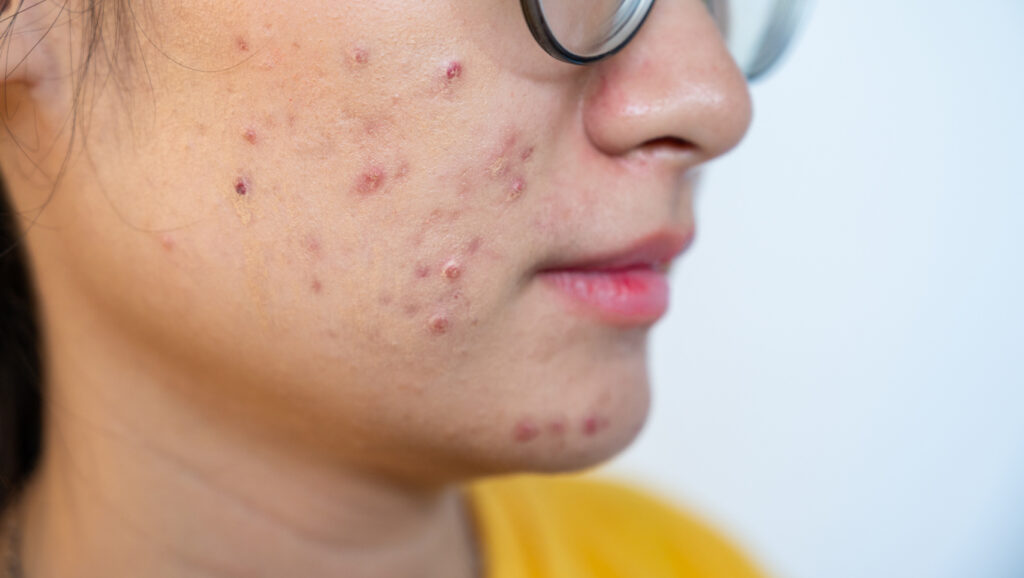Several topical benzoyl peroxide (BPO) acne and rosacea treatments may contain too-high levels of benzene, according to new research in the Journal of Investigative Dermatology.
BPO first made headlines in March 2024 when a report found high levels of benzene in certain BPO-containing acne products after incubation for days to weeks at temperatures of 37°C (99°F) and 50°C (122°F).
When this news first broke, report author Valisure, LLC, an independent testing laboratory, filed a petition with the U.S. Food and Drug Administration (FDA) requesting a recall of products affected by the elevated levels of benzene to allow regulators to investigate.
In July 2024, two reassuring studies showed that BPO exposure in patients with acne is not associated with an increased risk of cancer or increased blood benzene levels. Both of these studies are published in the Journal of the American Academy of Dermatology.
What did the new study show?
Fully 34% of 111 over-the-counter (OTC) products contain FDA’s 2 parts per million (PPM) limit.
Proactive contained 18 times the amount of the potent carcinogen allowed in U.S. drugs, and a CVS-brand face wash had 13 times levels considered safe by the FDA, the study showed. Around 70 products didn’t contain benzene levels above the U.S. limit when not exposed to heat. A few contained the carcinogen in amounts just above the U.S. limit. The study did not include prescription BPO products.
For the study, mass spectrometry methods were used to detect benzene in unopened products stored at room temperature on shelves of major U.S. retailers, and the air surrounding them with and without UV exposure.
Degradation of these products and formation of benzene appears to occur when sitting on shelves at room temperature, at elevated temperatures, and when exposed to ultraviolet (UV) levels representative of sunlight. The latter appears to occur more rapidly than heated storage and transportation conditions. Drug stabilization techniques like encapsulation do not appear to prevent the formation of benzene in BPO drug products. What’s more, the study shows that benzene formation can occur independently of the starting benzene concentration in new or cold temperature stored BPO drug products.
“Our research demonstrates that BPO products can generate benzene at typical room and store shelf temperatures, while cold storage significantly reduces this formation,” says study co-investigator Christopher G. Bunick, MD, PhD of the Department of Dermatology and Program in Translational Biomedicine at Yale University School of Medicine in New Haven, CT, in a news release. “These findings suggest a need to recommend refrigeration of BPO products throughout the supply chain—from manufacturing to patient use—to limit benzene exposure. Until formulations are developed to prevent benzene formation, refrigeration may serve as a practical solution to minimize unnecessary exposure. Additionally, dermatologists should continue to advise patients on the appropriate use of BPO, including potential risks associated with UV exposure.”
TDD media partner the American Acne and Rosacea Society suggests following safe BPO storage procedures to minimize the potential for benzene formation. Some products also indicate specific instructions on how long to keep a BPO-containing product until it should be discarded. Other recommendations include discarding expired BPO products and those that have been exposed to temperatures above room temperature. For new BPO products, store at refrigerator temperature and replace BPO products every three months or as recommended on the specific product.
Experts React
“This data offers guidance on safe use… encourag[ing] refrigeration of the medicine at all times, replace the medicine every three months or so, and avoid storage in or near heat and sunlight,” Adam Friedman, MD, Professor and Chair of Dermatology at the George Washington School of Medicine in Washington, DC, tells TDD.
“With our prescription drugs, keeping them refrigerated seems to be the best course of action until we get more information,” Julie Harper, MD, a dermatologist in Birmingham, AL, tells TDD.
If, when, or how the FDA will revise this statement is unknown at the present time.
“Our research demonstrates that these products, widely used by consumers of all ages, can potentially contain or generate concerningly high levels of benzene, particularly under common environmental conditions,” says lead investigator David Light, Co-Founder and President of Valisure, LLC, New Haven, CT, and Affiliate Professor at Arnold & Marie Schwartz College of Pharmacy and Health Sciences, Long Island University, Long Island, NY. “This issue highlights the critical importance of rigorous independent testing of drug products to help protect consumers from harmful contaminants or degradation products.”
Richard L. Gallo, MD, PhD, a dermatologist in the Department of Dermatology at University of California San Diego, CA adds, “This carefully done analysis should put to rest the question of whether benzene is present in skin care products that contain BPO. It is now important that further studies be conducted to determine if the presence of this potential carcinogen in drugs with BPO translates into any increased risk of cancer.
Steve Xu MD MSc, a dermatologist at Northwestern University Feinberg School of Medicine, Chicago, IL, adds, “As the first dermatologist to publish on consumer complaints related to personal care products submitted to the Food and Drug Administration’s Center for Food Safety and Applied Nutrition’s Adverse Event Reporting System, I have long been concerned about the public health safety of these lightly regulated products available in retailers worldwide. BPO products for acne are now the newest addition to a growing list of products that have been recalled or raise safety concerns joining formaldehyde releasing hair care products, benzene contaminated deodorants, and phthalates in shampoos.”


